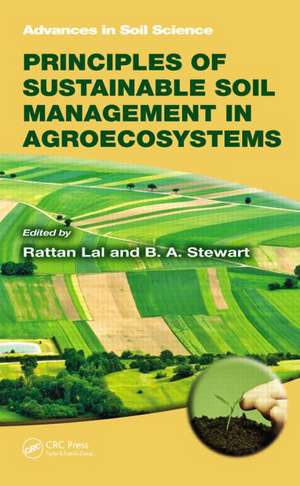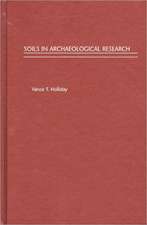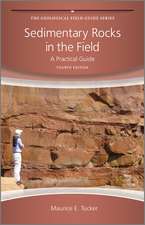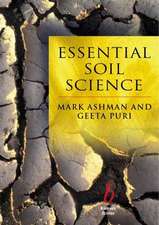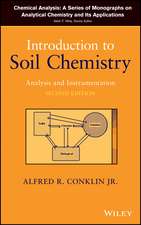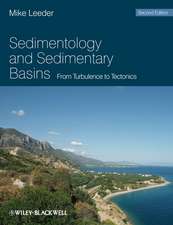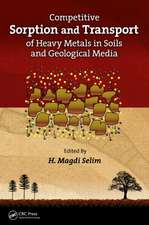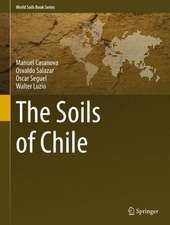Principles of Sustainable Soil Management in Agroecosystems: Advances in Soil Science
Editat de Rattan Lal, B. A. Stewarten Limba Engleză Hardback – 10 iun 2013
With chapters contributed by world-class soil scientists, ecologists, and social scientists, this book outlines critical changes in management of agricultural soils necessary to achieve food security and meet the food demands of the present and projected future population. These changes include conversion to no-till and conservation agriculture; adoption of strategies of integrated nutrient management, water harvesting, and use of drip sub-irrigation; complex cropping/farming systems such as cover cropping and agroforestry; and use of nano-enhanced fertilizers.
The book is based on the premise that it is not possible to extract more from a soil than what is put into it without degrading its quality. The strategy is to replace what is removed, respond wisely to what is changed, and be pro-active to what may happen because of natural and anthropogenic perturbations. The chapters, which exemplify these ideas, cover a range of topics including organic farming, soil fertility, crop-symbiotic soil microbiota, human-driven soil degradation, soil degradation and restoration, carbon sink capacity of soils, soil renewal and sustainability, and the marginality principle.
Din seria Advances in Soil Science
-
 Preț: 444.08 lei
Preț: 444.08 lei -
 Preț: 448.67 lei
Preț: 448.67 lei - 25%
 Preț: 427.84 lei
Preț: 427.84 lei - 15%
 Preț: 467.93 lei
Preț: 467.93 lei - 18%
 Preț: 1954.45 lei
Preț: 1954.45 lei - 12%
 Preț: 312.43 lei
Preț: 312.43 lei -
 Preț: 374.21 lei
Preț: 374.21 lei - 25%
 Preț: 941.40 lei
Preț: 941.40 lei -
 Preț: 448.44 lei
Preț: 448.44 lei - 15%
 Preț: 473.34 lei
Preț: 473.34 lei - 18%
 Preț: 1304.13 lei
Preț: 1304.13 lei - 22%
 Preț: 464.32 lei
Preț: 464.32 lei - 18%
 Preț: 1300.62 lei
Preț: 1300.62 lei - 18%
 Preț: 1941.67 lei
Preț: 1941.67 lei - 18%
 Preț: 1284.86 lei
Preț: 1284.86 lei - 15%
 Preț: 461.03 lei
Preț: 461.03 lei - 18%
 Preț: 1290.23 lei
Preț: 1290.23 lei - 18%
 Preț: 1119.62 lei
Preț: 1119.62 lei - 18%
 Preț: 1290.71 lei
Preț: 1290.71 lei - 18%
 Preț: 1233.70 lei
Preț: 1233.70 lei - 15%
 Preț: 641.38 lei
Preț: 641.38 lei - 15%
 Preț: 636.63 lei
Preț: 636.63 lei - 15%
 Preț: 643.84 lei
Preț: 643.84 lei - 15%
 Preț: 637.46 lei
Preț: 637.46 lei - 15%
 Preț: 701.59 lei
Preț: 701.59 lei - 15%
 Preț: 636.30 lei
Preț: 636.30 lei - 15%
 Preț: 639.59 lei
Preț: 639.59 lei - 15%
 Preț: 638.43 lei
Preț: 638.43 lei - 15%
 Preț: 648.89 lei
Preț: 648.89 lei - 15%
 Preț: 641.71 lei
Preț: 641.71 lei - 15%
 Preț: 637.59 lei
Preț: 637.59 lei -
 Preț: 385.47 lei
Preț: 385.47 lei - 15%
 Preț: 641.85 lei
Preț: 641.85 lei - 15%
 Preț: 637.28 lei
Preț: 637.28 lei - 15%
 Preț: 637.59 lei
Preț: 637.59 lei - 15%
 Preț: 638.57 lei
Preț: 638.57 lei - 15%
 Preț: 637.46 lei
Preț: 637.46 lei - 15%
 Preț: 637.93 lei
Preț: 637.93 lei -
 Preț: 384.70 lei
Preț: 384.70 lei - 15%
 Preț: 637.28 lei
Preț: 637.28 lei - 28%
 Preț: 1414.85 lei
Preț: 1414.85 lei
Preț: 1289.11 lei
Preț vechi: 1572.08 lei
-18% Nou
Puncte Express: 1934
Preț estimativ în valută:
246.70€ • 267.88$ • 207.23£
246.70€ • 267.88$ • 207.23£
Carte tipărită la comandă
Livrare economică 22 aprilie-06 mai
Preluare comenzi: 021 569.72.76
Specificații
ISBN-13: 9781466513464
ISBN-10: 1466513462
Pagini: 568
Ilustrații: 97 b/w images, 90 tables and N/A
Dimensiuni: 156 x 234 x 36 mm
Greutate: 0.93 kg
Ediția:New.
Editura: CRC Press
Colecția CRC Press
Seria Advances in Soil Science
ISBN-10: 1466513462
Pagini: 568
Ilustrații: 97 b/w images, 90 tables and N/A
Dimensiuni: 156 x 234 x 36 mm
Greutate: 0.93 kg
Ediția:New.
Editura: CRC Press
Colecția CRC Press
Seria Advances in Soil Science
Public țintă
Academic and Professional ReferenceCuprins
Principles of Soil Management. Marginality Principle. Principles of Soil Management in Neotropical Savannas: The Brazilian Cerrado. Facts and Myths of Feeding the World with Organic Farming Methods. Building upon Traditional Knowledge to Enhance Resilience of Soils in Sub-Saharan Africa. Soil Fertility as a Contingent Rather than Inherent Characteristic: Considering the Contributions of Crop-Symbiotic Soil Microbiota. Human Dimensions That Drive Soil Degradation. Managing Soil Organic Carbon Concentration by Cropping Systems and Fertilizers in the North China Plain. Global Extent of Land Degradation and Its Human Dimension. Cost–Benefit Analysis of Soil Degradation and Restoration. Spiritual Aspects of Sustainable Soil Management. Theological and Religious Approaches to Soil Stewardship. Traditional Knowledge for Sustainable Management of Soils. Sustainable Soil Management Is More Than What and How Crops are Grown. Mining of Nutrients in African Soils Due to Agricultural Intensification. Carbon Sink Capacity and Agronomic Productivity of Soils of Semiarid Regions of India. Soil Renewal and Sustainability. Organic Carbon Sequestration Potential and the Co-Benefits in China’s Cropland. Soil Management for Sustaining Ecosystem Services.
Notă biografică
Rattan Lal is a distinguished university professor of soil physics in the School of Environment and Natural Resources and the director of the Carbon Management and Sequestration Center, Food, Agricultural, and Environmental Sciences/Ohio Agriculture Research and Development Center, at the Ohio State University. Previously, he was a soil physicist for 18 years at the International Institute of Tropical Agriculture, Ibadan, Nigeria. Professor Lal conducted long-term experiments on topics including land use, watershed management, soil properties, soil tillage and crop-residue management, and cropping systems. He has continued research on erosion-induced changes in soil quality and developed a new project on soils and climate change. He has demonstrated that accelerated soil erosion is a major factor affecting emission of carbon from the soil to the atmosphere.
B.A. Stewart is a distinguished professor of soil science at the West Texas A&M University, Canyon, Texas. He is also the director of the Dryland Agriculture Institute and a former director of the US Department of Agriculture (USDA) Conservation and Production Laboratory at Bushland, Texas; a past president of the Soil Science Society of America; and a member of the 1990–1993 Committee on Long- Range Soil and Water Policy, National Research Council, National Academy of Sciences. He is a fellow of the Soil Science Society of America, American Society of Agronomy, and Soil and Water Conservation Society and a recipient of the USDA Superior Service Award and the Hugh Hammond Bennett Award of the Soil and Water Conservation Society.
B.A. Stewart is a distinguished professor of soil science at the West Texas A&M University, Canyon, Texas. He is also the director of the Dryland Agriculture Institute and a former director of the US Department of Agriculture (USDA) Conservation and Production Laboratory at Bushland, Texas; a past president of the Soil Science Society of America; and a member of the 1990–1993 Committee on Long- Range Soil and Water Policy, National Research Council, National Academy of Sciences. He is a fellow of the Soil Science Society of America, American Society of Agronomy, and Soil and Water Conservation Society and a recipient of the USDA Superior Service Award and the Hugh Hammond Bennett Award of the Soil and Water Conservation Society.
Recenzii
"This book makes the case for sustainable soil management as an essential prerequisite to securing global food supply. … The strength of the book lies in the wide array of topics presented from diverse viewpoints. ... Overall, the book is an engaging and stimulating read. It effectively makes the case for the necessity of including soils as the central focus of all efforts to feed a growing world population in a sustainable manner in the face of a changing climate. Summing Up: Recommended. Upper-division undergraduates and above."
—J. R. Reeve, Utah State University, CHOICE, February 2014
—J. R. Reeve, Utah State University, CHOICE, February 2014
Descriere
This book describes the laws of sustainable soil management to enhance ecosystem services while restoring degraded soils and promoting sustainable use. With chapters contributed by world-class soil scientists, ecologists, and social scientists, the book outlines critical changes in management of agricultural soils necessary to address global issues of food security, climate change, water security, and energy needs. Topics covered include organic farming, soil fertility, crop-symbiotic soil microbiota, human-driven soil degradation, soil degradation and restoration, carbon sink capacity of soils, and soil renewal and sustainability.
